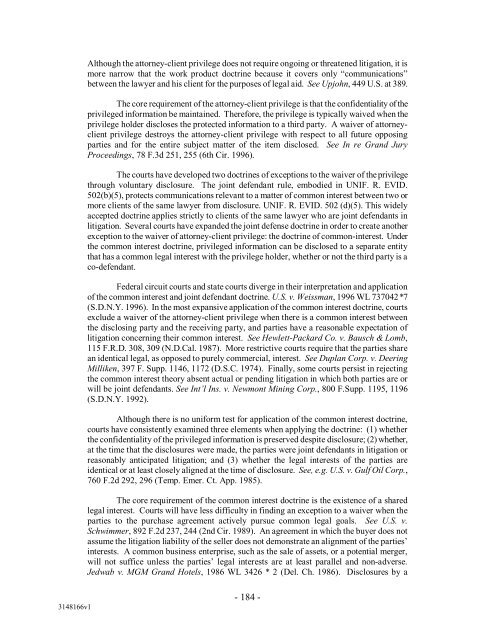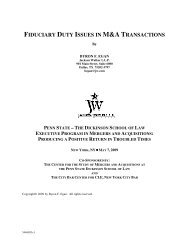asset acquisitions - Jackson Walker LLP
asset acquisitions - Jackson Walker LLP
asset acquisitions - Jackson Walker LLP
Create successful ePaper yourself
Turn your PDF publications into a flip-book with our unique Google optimized e-Paper software.
Although the attorney-client privilege does not require ongoing or threatened litigation, it ismore narrow that the work product doctrine because it covers only “communications”between the lawyer and his client for the purposes of legal aid. See Upjohn, 449 U.S. at 389.The core requirement of the attorney-client privilege is that the confidentiality of theprivileged information be maintained. Therefore, the privilege is typically waived when theprivilege holder discloses the protected information to a third party. A waiver of attorneyclientprivilege destroys the attorney-client privilege with respect to all future opposingparties and for the entire subject matter of the item disclosed. See In re Grand JuryProceedings, 78 F.3d 251, 255 (6th Cir. 1996).The courts have developed two doctrines of exceptions to the waiver of the privilegethrough voluntary disclosure. The joint defendant rule, embodied in UNIF. R. EVID.502(b)(5), protects communications relevant to a matter of common interest between two ormore clients of the same lawyer from disclosure. UNIF. R. EVID. 502 (d)(5). This widelyaccepted doctrine applies strictly to clients of the same lawyer who are joint defendants inlitigation. Several courts have expanded the joint defense doctrine in order to create anotherexception to the waiver of attorney-client privilege: the doctrine of common-interest. Underthe common interest doctrine, privileged information can be disclosed to a separate entitythat has a common legal interest with the privilege holder, whether or not the third party is aco-defendant.Federal circuit courts and state courts diverge in their interpretation and applicationof the common interest and joint defendant doctrine. U.S. v. Weissman, 1996 WL 737042 *7(S.D.N.Y. 1996). In the most expansive application of the common interest doctrine, courtsexclude a waiver of the attorney-client privilege when there is a common interest betweenthe disclosing party and the receiving party, and parties have a reasonable expectation oflitigation concerning their common interest. See Hewlett-Packard Co. v. Bausch & Lomb,115 F.R.D. 308, 309 (N.D.Cal. 1987). More restrictive courts require that the parties sharean identical legal, as opposed to purely commercial, interest. See Duplan Corp. v. DeeringMilliken, 397 F. Supp. 1146, 1172 (D.S.C. 1974). Finally, some courts persist in rejectingthe common interest theory absent actual or pending litigation in which both parties are orwill be joint defendants. See Int’l Ins. v. Newmont Mining Corp., 800 F.Supp. 1195, 1196(S.D.N.Y. 1992).Although there is no uniform test for application of the common interest doctrine,courts have consistently examined three elements when applying the doctrine: (1) whetherthe confidentiality of the privileged information is preserved despite disclosure; (2) whether,at the time that the disclosures were made, the parties were joint defendants in litigation orreasonably anticipated litigation; and (3) whether the legal interests of the parties areidentical or at least closely aligned at the time of disclosure. See, e.g. U.S. v. Gulf Oil Corp.,760 F.2d 292, 296 (Temp. Emer. Ct. App. 1985).The core requirement of the common interest doctrine is the existence of a sharedlegal interest. Courts will have less difficulty in finding an exception to a waiver when theparties to the purchase agreement actively pursue common legal goals. See U.S. v.Schwimmer, 892 F.2d 237, 244 (2nd Cir. 1989). An agreement in which the buyer does notassume the litigation liability of the seller does not demonstrate an alignment of the parties’interests. A common business enterprise, such as the sale of <strong>asset</strong>s, or a potential merger,will not suffice unless the parties’ legal interests are at least parallel and non-adverse.Jedwab v. MGM Grand Hotels, 1986 WL 3426 * 2 (Del. Ch. 1986). Disclosures by a3148166v1- 184 -
















